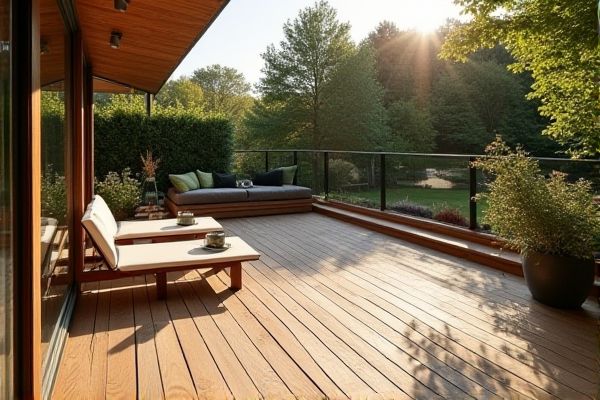
Softwood decking offers affordability and easier installation, while hardwood decking provides superior durability and natural resistance to weathering and insects. Discover which type of decking best suits Your outdoor space by exploring the detailed comparison ahead.
Table of Comparison
| Feature | Softwood Decking | Hardwood Decking |
|---|---|---|
| Wood Type | Pine, Cedar, Redwood | Teak, Ipe, Mahogany |
| Durability | Moderate, prone to dents | High, resistant to wear & decay |
| Cost | Lower price, budget-friendly | Higher price, premium quality |
| Maintenance | Requires regular sealing & staining | Low maintenance, natural oils resist decay |
| Appearance | Lighter color, rustic look | Rich color, smooth finish |
| Environmental Impact | Often sustainably sourced, faster growth | Less sustainable, slow growth, exotic species |
| Installation | Easier to cut & install | Harder to work with, requires special tools |
| Longevity | 5-15 years with maintenance | 25-50 years or more |
Introduction to Softwood and Hardwood Decking
Softwood decking, sourced primarily from coniferous trees like pine and cedar, offers a lightweight and cost-effective option ideal for a variety of outdoor projects. Hardwood decking, derived from dense tropical or temperate trees such as ipe and teak, provides superior durability, resistance to decay, and a premium aesthetic that enhances your outdoor space. Understanding the key differences in grain, texture, and maintenance helps determine the best decking material for your specific needs and environmental conditions.
Key Differences Between Softwood and Hardwood Decking
Softwood decking, typically sourced from pine, cedar, or fir, is generally more affordable, easier to cut, and tends to absorb stains and finishes better than hardwood. Hardwood decking, such as teak, ipe, or mahogany, offers superior durability, resistance to weather and insects, and a longer lifespan, often making it a premium choice for outdoor projects. Your choice depends on budget, desired lifespan, maintenance commitment, and aesthetic preferences, as hardwood requires less frequent upkeep but comes at a higher initial cost.
Durability and Lifespan Comparison
Hardwood decking, such as ipe and teak, offers superior durability and a longer lifespan, often exceeding 25 years with proper maintenance, due to its dense grain and natural resistance to rot and insects. Softwood decking, including cedar and pine, typically lasts around 10 to 15 years but requires regular sealing and treatment to prevent decay and weather damage. Your choice impacts long-term maintenance costs and aesthetic longevity, with hardwood providing a more resilient investment against environmental wear.
Maintenance Requirements for Each Decking Type
Softwood decking requires regular sealing and staining to protect against moisture, insects, and UV damage, while hardwood decking is naturally dense and more resistant to these elements, reducing the frequency of maintenance. Your softwood deck may need annual or biannual upkeep to maintain its appearance and structural integrity, whereas hardwood decks only require occasional cleaning and resealing every few years. Choosing hardwood decking can save time and effort in maintenance, making it a durable yet low-maintenance option for your outdoor space.
Cost Analysis: Softwood vs. Hardwood Decking
Softwood decking generally costs less upfront compared to hardwood decking, making it a budget-friendly option for many homeowners. Hardwood decking demands a higher initial investment due to its durability, density, and natural resistance to decay, which can lower maintenance expenses over time. Choosing between softwood and hardwood decking depends on your budget and long-term value preferences, with softwood offering affordability and hardwood providing greater longevity and strength.
Aesthetic Appeal and Design Flexibility
Softwood decking offers a natural, rustic appearance with a lighter color palette and prominent grain patterns ideal for casual, coastal, or cottage-style designs. Hardwood decking provides a rich, dense texture with deeper, more uniform hues perfect for sophisticated, modern, or luxury outdoor spaces. Design flexibility in softwood includes easier cutting and shaping, while hardwood's durability allows for intricate detailing and longer-lasting finishes.
Environmental Impact and Sustainability
Softwood decking, often sourced from faster-growing coniferous trees like pine and cedar, typically has a lower environmental impact due to its rapid renewability and efficient carbon sequestration. Hardwood decking, derived from slow-growing tropical or temperate species such as teak and ipe, tends to have higher durability but can contribute to deforestation and biodiversity loss if not certified by organizations like FSC or PEFC. Sustainable decking choices prioritize certified softwoods or reclaimed hardwoods, balancing longevity with responsible forest management practices to minimize ecological footprints.
Weather Resistance and Performance
Softwood decking, typically made from pine or cedar, offers decent weather resistance when properly treated with sealants and preservatives but is more susceptible to moisture damage and decay over time compared to hardwood options. Hardwood decking, such as ipe, teak, or mahogany, exhibits superior natural resistance to rot, insects, and extreme weather conditions, providing enhanced durability and longer-lasting performance in various climates. Choosing hardwood decking ensures your outdoor space remains structurally sound and visually appealing despite exposure to harsh environmental elements.
Installation Process and Ease
Softwood decking offers a lighter weight and easier handling, which generally simplifies the installation process compared to hardwood decking, often requiring fewer tools and less labor-intensive preparation. Hardwood decking, while denser and more durable, demands pre-drilling and specialized fasteners to prevent splitting, making the installation more complex and time-consuming. Your choice between softwood and hardwood will significantly impact the ease and speed of your decking installation project.
Which Decking Type Is Best for You?
Softwood decking, typically made from pine, cedar, or fir, offers affordability and ease of installation but requires regular maintenance to prevent rot and insect damage. Hardwood decking, such as ipe, teak, or mahogany, provides superior durability, natural resistance to decay, and a luxurious appearance that can increase your property's value. Your choice depends on budget, maintenance commitment, and desired lifespan for a deck that suits your outdoor living needs.
 homyna.com
homyna.com